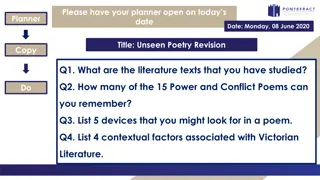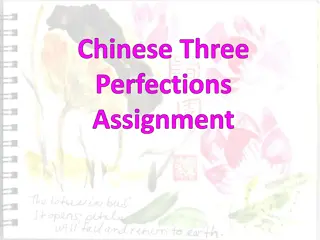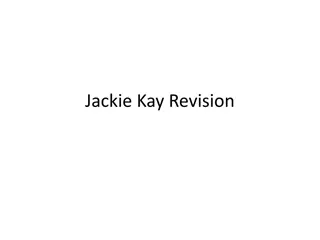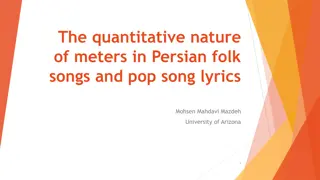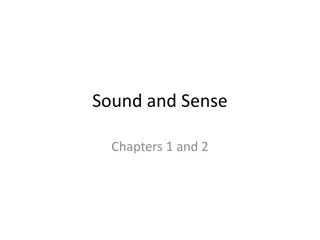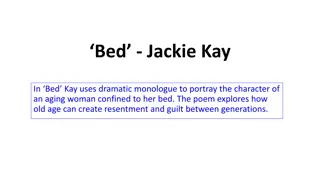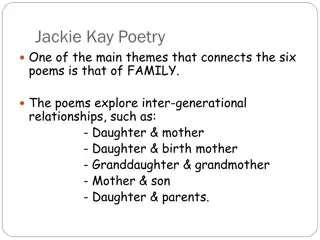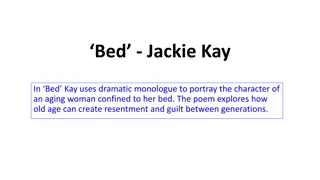Exploring Poetry with Jackie Kay
Delve into the world of poetry with Jackie Kay through this enriching unit. Learn to analyze and interpret poems, develop vocabulary for discussion, and enhance speaking and listening skills. Discover the art of poetry through works by Jackie Kay and other poets, exploring themes and engaging in writing tasks to deepen your understanding.
Download Presentation

Please find below an Image/Link to download the presentation.
The content on the website is provided AS IS for your information and personal use only. It may not be sold, licensed, or shared on other websites without obtaining consent from the author. Download presentation by click this link. If you encounter any issues during the download, it is possible that the publisher has removed the file from their server.
E N D
Presentation Transcript
Lets Face It! THE POETRY OF JACKIE KAY
Lesson one ABOUT THIS UNIT AND THE AUTHOR
In this unit you will learn to: Look how a writer develops ideas through the way they write and organise poetry. Work out your own interpretation of a poem. Develop the specific vocabulary needed to discuss a poem. Use speaking and listening skills to develop your thinking and express your ideas.
What you will study Poems by Jackie Kay. Poems written before 1900 which are linked by theme to Jackie Kay s modern poems. Some media articles about the themes in the poems
The Pen When you see this be ready to do some writing! Sometimes it will be notes and sometimes it will be a more formal task. I will tell you which!
The Questioning Sheet You should stick this into your book after the title page for this unit. Use it to help you whenever you get stuck talking about a poem.
In your groups think about the following question: WHAT IS POETRY FOR? Why do people write it? Why do people read it? Why do we study it in school? On A1 paper make a list of the ideas your group has. Remember what I have said about opinions. Be ready to feedback your ideas and opinions .
All About Jackie Kay Born in Edinburgh, Scotland in 1961 Mixed heritage Scottish and Nigerian Adopted Bought up in Glasgow Studied at The royal Scottish Academy of Music and Drama , Glasgow Studied English at Stirling University First Published in 1991 Has won several Awards for her writing MBE services to literature
LESSON TWO LOOKING AT A POEM AND TALKING ABOUT IT
The First Poem The title is: At Home, Abroad. Jackie Kay thinks about her mixed heritage You will read it in silence. We will read it together. There will be 30 seconds thinking time before anyone talks. I call this Impact Time it allows everyone to decide what they think before we discuss the poem together.
At Home, Abroad All Summer I dream of Places I ve never Been Where I Might See faces I ve never seen, Like the dark Face of my Father in Nigeria, Or the pale Face of my Mother in The Highlands Or the bright Faces of my Cousins at Land s End. All Summer I spell the names Of tricky countries Just in case I get a sudden Invite: Madagascar, Cameroon. I draw Cartoons of Airports, big and small Who will meet me? Will they Shake hands or Kiss both cheeks? I draw Duty frees With every country s favourite Sweetie, smiling A sugary welcome And myself Cap-peaked, Wondering if I am Home .
New Vocabulary! STANZAS Poets often divide their poems into groups of lines called stanzas . Stanzas are separated by a space on the page. It is much better when talking about poetry to say stanzas rather than verses !
In Pairs Discuss how Jackie Kay feels about not knowing her birth parents. How does Jackie Kay use words and punctuation to suggest her own uncertainty about her background? Think about Settings and locations Why the poem is divided into two stanzas Repetition of words and phrases Contrasting Language Discussion Toolkit: I think I suppose Probably Presumably This suggests It can Possibly What if ...? I wonder It may Maybe What About ? I guess It might perhaps Be ready to feedback your ideas.
LESSON THREE LEARNING TO WRITE ABOUT POETRY
Today we are learning to: What poetic devices are. How we talk about them. What words we need to learn to use.
Poetic Devices This is the academic name for all the words and expressions we use when we are talking about poetry. There are a LOT of them we will learn them in small groups as we need to use them. YOU DON T NEED TO WRITE THIS BIT . If you are not sure about a poetic device and how it is used - look in your notes first. If you cannot find the answer ASK!
Word List Imagery Contrasts Comparisons Metaphor Tone Rhythm Pace
Definitions Repetition When a word or phrase is repeated for emphasis or effect. Imagery - When words are used to paint pictures. Contrasts When opposites are used together for effect. Comparisons - When two or more things are compared to create more meaning. Metaphor - When a word or phrase usually linked to a specific item or situation is used out of context to imply some similarity. Tone - The sound or emotion of the poetic voice. Rhythm - The beat of the poetry Pace - The speed the sound of poetry moves at easy to hear when you read it aloud.
Working on the poem We will be looking for these devices in At Home, Abroad Make notes on your copy. Ask questions and think hard! A lot of interpretation begins with opinions. You can say what you like but you must be able to say WHY you think it and give EXAMPLES from the poem to support your opinion.
PEE!! Point: What you want to say/what you think. - this is your idea or opinion. Evidence: An example of exactly what makes you think that a quote from the text you are analysing . Explanation : WHY you think it explain yourself! So now you know what we mean by P.E.E! (you will hear it a LOT)
All Summer I dream of Places I ve never Been Where I Might See faces I ve never seen, Like the dark Face of my Father in Nigeria, Or the pale Face of my Mother in The Highlands Or the bright Faces of my Cousins at Land s End. Stanza One
All Summer I spell the names Of tricky countries Just in case I get a sudden Invite: Madagascar, Cameroon. I draw Cartoons of Airports, big and small Who will meet me? Will they Shake hands or Kiss both cheeks? I draw Duty frees With every country s favourite Sweetie, smiling A sugary welcome And myself Cap-peaked, Wondering if I am Home . Stanza Two
Homework Due: Write an analysis of At Home, Abroad . Answer the following: 1. What does Jackie Kay say about her feelings towards her birth parents? How do you know? 2. What are the main images in this poem give examples. 3. Do you like this poem? Explain your answer. Extension Question (optional) What do you think the title means? Explain your opinion. You should aim to write at least one page but no more than two. Remember PEE!!!
LESSON FOUR JACKIE KAY ON BULLIES!
Today we are learning to: Think about how feelings are expressed through poetry Think about the theme of Bullying Find evidence from a media text as well as a poem.
Writers revenge on school bullies. An Award winning Scottish Author has told how racist bullying at school started her on the path to becoming a writer. Jackie Kay told a newspaper how she would write Little poems of revenge . She said that she thought she would always be affected by the taunts she suffered at school. She told the newspaper that three boys at her school had taunted her because of the colour of her skin and forced her to eat mud. What I found excruciatingly embarrassing was that I was with friends. In a strange way you felt you were embarrassing your friends. She said. She did not recall any of her friends sticking up for her. The Poet said she was no longer angry at what happened to her. But it still affects me, always will. If I pass a group of laughing kids, even now, part of me thinks they re laughing at me. Own experiences Jackie Kay often draws upon her own experiences as inspiration for her writing. Here is an extract from a newspaper article where she talks about her experience of racist bullying taken from the BBC Scotland Website.
TASK Using the Article printout How did Jackie Kay feel about being bullied? How does she feel now? Record your comments in a table: (I have done the first entry for you.) How she felt/feels now (felt) Embarrassed Evidence You were embarrassing your friends
Read Duncan Gets Expelled. This poem describes the event Jackie Kay tells the newspaper reporter about. It describes being bullied at Primary school and is about one particular boy who made her break times a real misery. The name she gives the boy in the poem is not his real name. If he read it do you think he would recognise himself?
Lesson five THINKING ABOUT DUNCAN MACKAY
Today we are Learning to: Analyse poetry for mood and tone. Think actively about language choices and how they influence the reader Thinking about advice on bullying and what to do
Vocabulary Perspective Alliteration Sentence length Direct speech
Definitions Perspective whose point of view is it written in first or third person. Alliteration The repetition of a sound at the start of a word Sentence length can change the speed of a poem and the feeling of the message. Direct speech shown in speech marks gives a poem a more personal tone.
Task Working in small groups Discuss how Jackie Kay uses her imagination and skill as a poet to make the experience of being bullied really frightening and threatening. THINK ABOUT, and write down with examples: How she describes the boys physical appearance . the use of dialogue. How she describes fear both hers and her friends. Her own behaviour in school. What tone of voice do you think the last stanza should be read in? Explain your reasons. Be ready to feedback your answers to the class
Thinking about Bullying What advice would you give to someone being bullied? Make a list of helpful suggestions. HOMEWORK Design a top five advice poster for school
Lesson six JACKIE KAY AND GROWING UP
Today we are learning to: Think about how a poet grabs our attention How to find clues about the theme of a poem Analyse your own response to a poem
Attention Seeking We will read this together and then have 30 seconds impact time. In silence write down your response to this poem.
In pairs consider: How Jackie Kay grabs our attention in this poem Think about the answer to this and write down (using PEE) your ideas on: The subject matter. The poetic devices used. How a strong viewpoint is conveyed. Has this changed your own response? You can use your questioning sheet if you get stuck!
Why does the boy behave like this? Find five examples from the text that help you to understand why the boy behaves so badly. Can you empathise with him? Be ready to share your suggestions
Lesson Seven BEING STRESSED OUT
Today we are learning to: Empathise with the character in a poem Share ideas and use the correct language when talking about poetry Respond to unexpected questions
Read Stressed Out I am totally stressed out. I can t sleep at night. I shake when I hear them shout. He has his nerve pills, she has her alcohol. Bullies Posted in the playground. Many things to remember. I told my mother: I said, I am totally stressed out. Me? I have nothing at all. There is no one to talk to. I have this strange singing in my head. At night, alone in bed, She said: Don t be silly Children don t get stressed. Like hell they don t . I said. And she sent me to my room for swearing. The Stress is in my sheets, Clinging to my nightdress, Climbing in through the windows. There are tests tomorrow; So now here I am, Stuck in my stupid bedroom, Locked up, stressed out, all alone. I swear to bring my stress levels down. Life Sucks.
In Pairs Read the poem and think about the girl in it. Use the question sheet and together select five questions you would like to ask about the poem. Write just the questions down on a piece of paper.
TASK Exchange your questions with another pair In your own pair write an answer to the questions you have been given Remember to PEE. (both of you must write this down in your books) Join up with the pair you swapped with and discuss your answers. Think about the toolkit we used earlier when we explored At Home, Abroad . Don t forget to include everyone in the discussion.
Lesson Eight EXPLORING THE IDEAS AND PROBLEMS SHOW IN STRESSED OUT
Today we are Learning to: Convert a text to another type Use a poem to open a discussion about a theme Use our imaginations
In Groups Discuss what advice you would give to the narrator in the poem Stressed Out What Problems do you think she faces? Share your Ideas with the rest of the class.
Letters Laying out a letter depends on who you are writing to: Start with Dear (put in the name if you know it) Finish with Yours Faithfully if you don t know the person and sincerely if you do. You Should date your letter and put an address at the top.
TASK - individual Imagine you are the narrator in the poem. Write a letter to an agony aunt or advice column telling them what your problems are and asking for help. Here s some help you don t have to use it! Dear Deadre, Things have got so bad I don t know what to do. Every night I listen to my parents fighting. I am so Stressed out. On top of that .. To make it even worse
Lesson Nine COMPARING JACKIE KAY TO OTHER POETS




